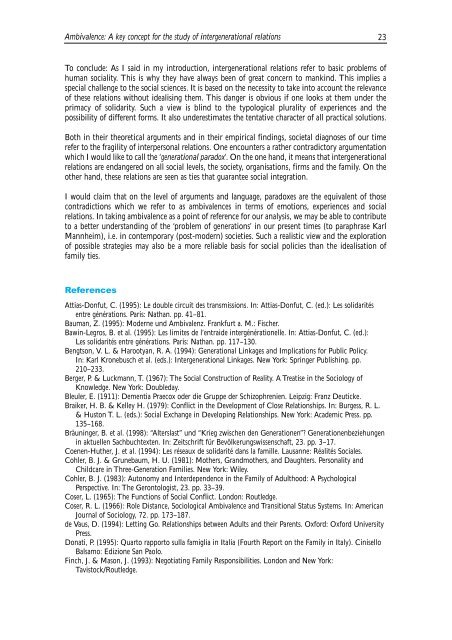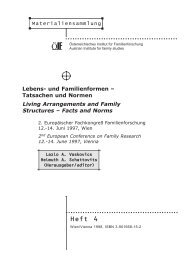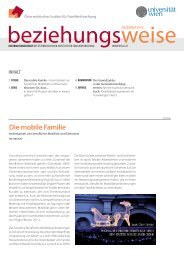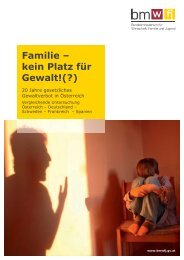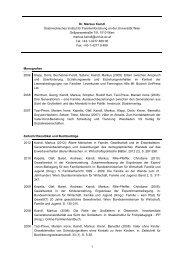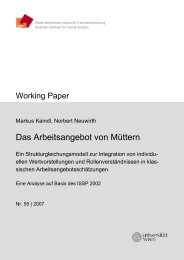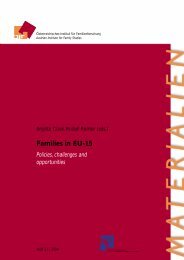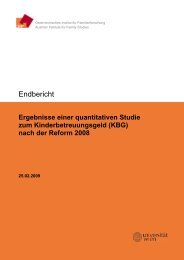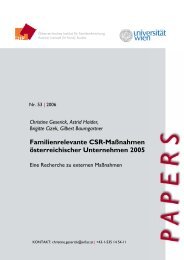Family issues between gender and generations
Family issues between gender and generations
Family issues between gender and generations
Create successful ePaper yourself
Turn your PDF publications into a flip-book with our unique Google optimized e-Paper software.
Ambivalence: A key concept for the study of intergenerational relations<br />
23<br />
To conclude: As I said in my introduction, intergenerational relations refer to basic problems of<br />
human sociality. This is why they have always been of great concern to mankind. This implies a<br />
special challenge to the social sciences. It is based on the necessity to take into account the relevance<br />
of these relations without idealising them. This danger is obvious if one looks at them under the<br />
primacy of solidarity. Such a view is blind to the typological plurality of experiences <strong>and</strong> the<br />
possibility of different forms. It also underestimates the tentative character of all practical solutions.<br />
Both in their theoretical arguments <strong>and</strong> in their empirical findings, societal diagnoses of our time<br />
refer to the fragility of interpersonal relations. One encounters a rather contradictory argumentation<br />
which I would like to call the ‘generational paradox’. On the one h<strong>and</strong>, it means that intergenerational<br />
relations are endangered on all social levels, the society, organisations, firms <strong>and</strong> the family. On the<br />
other h<strong>and</strong>, these relations are seen as ties that guarantee social integration.<br />
I would claim that on the level of arguments <strong>and</strong> language, paradoxes are the equivalent of those<br />
contradictions which we refer to as ambivalences in terms of emotions, experiences <strong>and</strong> social<br />
relations. In taking ambivalence as a point of reference for our analysis, we may be able to contribute<br />
to a better underst<strong>and</strong>ing of the ‘problem of <strong>generations</strong>’ in our present times (to paraphrase Karl<br />
Mannheim), i.e. in contemporary (post-modern) societies. Such a realistic view <strong>and</strong> the exploration<br />
of possible strategies may also be a more reliable basis for social policies than the idealisation of<br />
family ties.<br />
References<br />
Attias-Donfut, C. (1995): Le double circuit des transmissions. In: Attias-Donfut, C. (ed.): Les solidarités<br />
entre générations. Paris: Nathan. pp. 41–81.<br />
Bauman, Z. (1995): Moderne und Ambivalenz. Frankfurt a. M.: Fischer.<br />
Bawin-Legros, B. et al. (1995): Les limites de l’entraide intergénérationelle. In: Attias-Donfut, C. (ed.):<br />
Les solidarités entre générations. Paris: Nathan. pp. 117–130.<br />
Bengtson, V. L. & Harootyan, R. A. (1994): Generational Linkages <strong>and</strong> Implications for Public Policy.<br />
In: Karl Kronebusch et al. (eds.): Intergenerational Linkages. New York: Springer Publishing. pp.<br />
210–233.<br />
Berger, P. & Luckmann, T. (1967): The Social Construction of Reality. A Treatise in the Sociology of<br />
Knowledge. New York: Doubleday.<br />
Bleuler, E. (1911): Dementia Praecox oder die Gruppe der Schizophrenien. Leipzig: Franz Deuticke.<br />
Braiker, H. B. & Kelley H. (1979): Conflict in the Development of Close Relationships. In: Burgess, R. L.<br />
& Huston T. L. (eds.): Social Exchange in Developing Relationships. New York: Academic Press. pp.<br />
135–168.<br />
Bräuninger, B. et al. (1998): “Alterslast” und “Krieg zwischen den Generationen”? Generationenbeziehungen<br />
in aktuellen Sachbuchtexten. In: Zeitschrift für Bevölkerungswissenschaft, 23. pp. 3–17.<br />
Coenen-Huther, J. et al. (1994): Les réseaux de solidarité dans la famille. Lausanne: Réalités Sociales.<br />
Cohler, B. J. & Grunebaum, H. U. (1981): Mothers, Gr<strong>and</strong>mothers, <strong>and</strong> Daughters. Personality <strong>and</strong><br />
Childcare in Three-Generation Families. New York: Wiley.<br />
Cohler, B. J. (1983): Autonomy <strong>and</strong> Interdependence in the <strong>Family</strong> of Adulthood: A Psychological<br />
Perspective. In: The Gerontologist, 23. pp. 33–39.<br />
Coser, L. (1965): The Functions of Social Conflict. London: Routledge.<br />
Coser, R. L. (1966): Role Distance, Sociological Ambivalence <strong>and</strong> Transitional Status Systems. In: American<br />
Journal of Sociology, 72. pp. 173–187.<br />
de Vaus, D. (1994): Letting Go. Relationships <strong>between</strong> Adults <strong>and</strong> their Parents. Oxford: Oxford University<br />
Press.<br />
Donati, P. (1995): Quarto rapporto sulla famiglia in Italia (Fourth Report on the <strong>Family</strong> in Italy). Cinisello<br />
Balsamo: Edizione San Paolo.<br />
Finch, J. & Mason, J. (1993): Negotiating <strong>Family</strong> Responsibilities. London <strong>and</strong> New York:<br />
Tavistock/Routledge.


